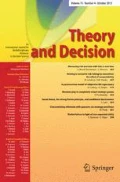Abstract
This paper provides a generalized characterization of the family of independence conditions which are equivalent to independence of irrelevant alternatives by proposing a pair-based refinement of \(\mathcal {S}\)-independence. Equipped with the new result, the relation between external independence conditions and independence of irrelevant alternatives is explored.
Similar content being viewed by others
Notes
The informational basis of most allocation rules in economic environment is closely related to the indifference curve. Information on indifference curve passing through \(x\) is equivalent to information of upper and lower contour sets of \(x\), which represents preference information on sets of pairs of alternatives rather than sets of alternatives.
Reflexivity requires for every \(x\in X\) \(xRx\); completeness requires for any \(x,y\in X\) \(xRy\) or \(yRx\); antisymmetric requires \(xIy \Rightarrow x=y\)
\(R|Int(S)=R\cap \bigcup \nolimits _{a\in Int(S)}a\times a =R\cap S\times S\)
Consider \(A\subseteq Pow^{n}(X)\) with \(n\ge 2\). Preferences restricted to \(A\) is equivalent to preferences restricted to \(\bigcup \nolimits _{a\in A}a\). Observe that \(\bigcup \nolimits _{a\in A}a \subseteq Pow^{n-1}(X)\). Continue this process we can reach some \(S\subseteq Pow(X)\) such that preferences restricted to \(A\) is equivalent to preferences restricted to \(S\). Further, because \(R|S\) is equivalent to \(R|\bigcup \nolimits _{a\in S}Int(a)\) for any \(S\subset Pow(X)\), subsets of \(Int(X)\) are enough to describe the whole self-dependent structure.
The argument in this paragraph is based on the observation of an anonymous referee.
References
Arrow, K. (1963). Social choice and individual values (2nd ed.). New Haven, Connecticut: Yale University Press.
Blair, D.H., Pollak, R.A., (1982). Acyclic collective choice rules. Econometrica: Journal of the Econometric Society, 50, 931–943.
Blau, J. H. (1971). Arrow’s theorem with weak independence. Economica, 38(152), 413–420.
Campbell, D., & Kelly, J. (2000). Information and preference aggregation. Social Choice and Welfare, 17(1), 3–24.
Campbell, D., & Kelly, J. (2007a). Social welfare functions that satisfy pareto, anonymity, and neutrality, but not independence of irrelevant alternatives. Social Choice and Welfare, 29(1), 69–82.
Campbell, D., & Kelly, J. (2007b). Pareto, anonymity, and independence: four alternatives. Social Choice and Welfare, 29(1), 83–104.
Cato, S., (2013). Independence of irrelevant alternatives revisited. Theory and Decision, 1, 1–17.
Fleurbaey, M., Suzumura, K., & Tadenuma, K. (2005a). Arrovian aggregation in economic environments: how much should we know about indifference surfaces? Journal of Economic Theory, 124(1), 22–44.
Fleurbaey, M., Suzumura, K., & Tadenuma, K. (2005b). The informational basis of the theory of fair allocation. Social Choice and Welfare, 24(2), 311–341.
Gibbard, A., (1969). Social choice and the arrow conditions. Unpublished manuscript.
Hansson, B. (1973). The independence condition in the theory of social choice. Theory and Decision, 4(1), 25–49.
Kelsey, D. (1985). Acyclic choice and group veto. Social Choice and Welfare, 2(2), 131–137.
Le Breton, M., & Truchon, M. (1995). Acyclicity and the dispersion of the veto power. Social Choice and Welfare, 12(1), 43–58.
Author information
Authors and Affiliations
Corresponding author
Rights and permissions
About this article
Cite this article
Qin, D. On \(\mathcal {S}\)-independence and Hansson’s external independence. Theory Decis 79, 359–371 (2015). https://doi.org/10.1007/s11238-014-9468-6
Published:
Issue Date:
DOI: https://doi.org/10.1007/s11238-014-9468-6



